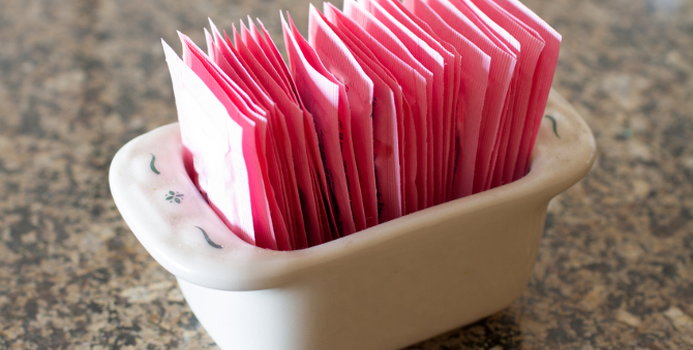Today, our food products, beverages and grocery store shelves are full of "zero-calorie" sweeteners that promise to satisfy our sweet tooth without the extra calories and carbohydrates of regular sugar. One of these alternatives, sucralose, which goes by the common name of Splenda, is used in a wide variety of products such as baked goods, frozen desserts and beverages.
Manufacturers have advertised Splenda as being more "natural" than other sweeteners due to the fact that the main substance, sucralose, comes from sugar. However, the means in which sucralose is produced is much more complicated. The final Splenda product is a chlorinated, chemically altered, non-carbohydrate sweetener. While a majority of scientific research has shown sucralose is safe for consumption, some research has indicated there may be some potential health risks associated with this popular sugar alternative.
Changes in Gut Microbiota
The human gut microbiota has become the subject of much research in recent years, and our knowledge of its composition and potential function is rapidly expanding. Our gut is home to a complex community of trillions of microbes which can ultimately influence metabolism, nutrition and immune function. In addition, disruption to the gut microbiota has been linked with GI conditions such as inflammatory bowel disease and obesity. Because sucralose is a chemically altered molecule, it is not recognized by our bodies. This means that when ingested it passes on to the large intestine where it is subject to be metabolized by these native gut microbes. Studies have linked sucralose to an altered amount and quality of the beneficial microbes by 50 percent or more, meaning it could have potential delirious effects on our natural physiology.
Weight Gain
The main reason that most turn to calorie-free artificial sweeteners is to avoid the extra calories associated with regular sugar. However, recent studies have suggested that because of the fact that artificial sweeteners don't satisfy the brain in the same way that real sugar does, this can lead to an overconsumption of calories. Furthermore, since Splenda takes away the guilt of consuming certain products along with the calories, this could naturally lead to an overindulgence.
Diabetes Risk
More recent studies have shown that Splenda, in addition to other sugar-imitators have been demonstrated to exert similar effects on the body as regular sugar, despite the lack of calories. Because our brains naturally associate "sweet" with calories, the body is still driven to release insulin, the sugar chaperone. One specific 2013 study found that individuals who consumed sucralose still had releases of insulin, and experienced an increase in blood glucose levels. This unnecessary release can lead to an increased risk of insulin resistance and type 2 diabetes.
Overall, while Splenda may seem like a guilt-free sugar alternative, satisfying your sweet tooth with this zero-calorie substitute may be doing more harm than good. Solid scientific data remains sparse and controversial, therefore practicing caution and moderation is recommended when doing away with natural sugars.

Sarah Dreifke is a freelance writer based in DeKalb, IL with a passion for nutrition education and the prevention of chronic disease. She holds a Bachelor of Science in both Dietetics and Life Sciences Communication from the University of Wisconsin-Madison. Currently, she is working towards a combined Master's Degree in Nutrition and Dietetics as well as a dietetic internship at Northern Illinois University.



